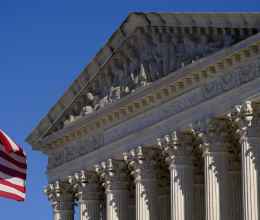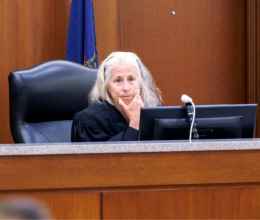On January 8, 1962, a letter appeared at the Supreme Court. It was written in pencil, from a jail cell at Florida State Prison, and began: “To the Honorable Earl Warren, Chief Justice of the United States, Comes now the petitioner, Clarence Earl Gideon, a citizen of the United States of America, in proper person, and appearing as his own counsel.”
Clarence Gideon was serving a five-year sentence for stealing bottled drinks and vending machine coins when he handwrote that letter. In it, he asked the Supreme Court to hear his case and rule that the right to counsel, as protected by the Sixth Amendment, should apply to every state, even in non-capital cases. He had been prosecuted, convicted, and sentenced without a lawyer, and he thought that was un-American.
On March 18, 1963 – exactly fifty years ago today – the Supreme Court agreed with Clarence Gideon. In its landmark decision, the Court found that the right to counsel is a fundamental right that no state may ignore. Poor defendants in criminal cases have a constitutional right to legal counsel even if they cannot afford it.
The ACLU supported Gideon by filing a friend of the court brief and working closely with Abe Fortas, a future Supreme Court Justice who argued the case. In the fifty years since, we’ve worked tirelessly to ensure that the right to counsel is honored. Unfortunately, that’s been a much harder struggle than we would have hoped.
As the Portland Press Herald wrote this morning, “Significantly more resources go to pay prosecutors than defenders, creating a dangerous imbalance in what is supposed to be a system in which all people are equal before the law. This is the kind of thing that the Supreme Court tried to fix in the Gideon case. Unfortunately, that work is far from done.”
Indigent defense services all around the country are drastically underfunded, preventing states from providing effective assistance of counsel, not to mention investigators and experts. To learn more about why the right to counsel isn’t being applied as often or effectively as it should, read today’s blog post at ACLU.org or this article from Friday’s New York Times.
Still, despite all the concerns we have over indigent defense, Gideon v. Wainwright remains a landmark decision, and its significance is manifold even if its application has been insufficient. No better example exists than Clarence Gideon himself.
The Court’s ruling was great news for Gideon, but it was only the first step towards justice – he still had to face a retrial. This time he came armed with a lawyer, and the inconsistencies of the prosecution quickly came to light. Gideon had originally been convicted largely on the basis of one eyewitness, whose testimony was torn apart on better cross-examination. As other new and important details came to light, serious doubt was cast on Gideon’s guilt. Sure enough, in his second trial he was acquitted on all charges.
Gideon’s story is as improbable as it is important. If you want to know more about him and the details of his trial, I highly suggest you read Gideon’s Trumpet, by Anthony Lewis. It’s a fabulous book with insight into many aspects of the case, as well as the structure of the Supreme Court and their system for handling the thousands of legal requests they get every year. If nothing else, it is a heartwarming portrayal of a system that made it possible for a handwritten letter from an inmate to become the foundation for a landmark decision that changed the course of law in the United States.
There is no better way to honor the memory of Clarence Gideon and his unlikely path to justice than to recommit ourselves to the principle of indigent defense and to ensure that no one has to stand trial without someone at their side to argue their case.

Clarence Gideon








